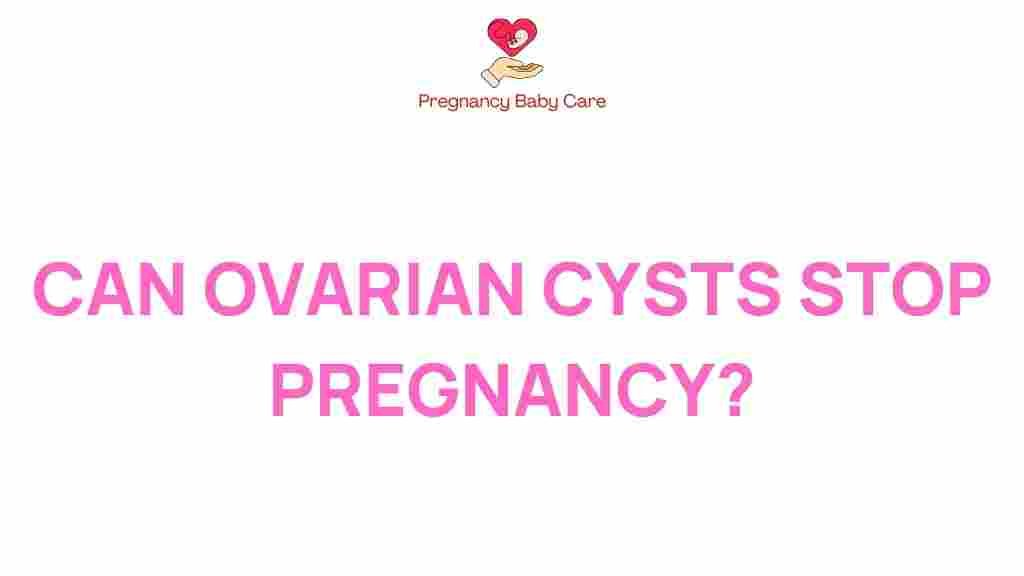Can Ovarian Cysts Impact Your Journey to Pregnancy?
When it comes to women’s health and reproductive issues, one topic that often arises is the presence of ovarian cysts. These fluid-filled sacs can form on the ovaries and may raise concerns for women trying to conceive. In this article, we will explore how ovarian cysts can impact pregnancy, their symptoms, the role of hormones, and how they relate to fertility and conception.
Understanding Ovarian Cysts
Ovarian cysts are common and often harmless. They typically form during the menstrual cycle and can vary in size and type. Most women will experience at least one cyst in their lifetime, and many do not even realize they have them. However, understanding ovarian cysts is crucial for those on a journey to pregnancy.
Types of Ovarian Cysts
There are several types of ovarian cysts, including:
- Functional Cysts: These are the most common type, resulting from the normal functioning of the ovaries. They include follicular cysts and corpus luteum cysts.
- Dermoid Cysts: These cysts can contain different types of tissue, such as hair, skin, or teeth.
- Cystadenomas: These are benign tumors that develop on the surface of the ovary and can become quite large.
- Endometriomas: These cysts are associated with endometriosis and can impact fertility.
Ovarian Cysts and Hormones
The formation of ovarian cysts is closely linked to hormonal fluctuations within the body. Hormones such as estrogen and progesterone regulate the menstrual cycle, and any imbalances can lead to the development of cysts. Women with conditions like polycystic ovary syndrome (PCOS) may experience multiple cysts and related hormonal issues, which can affect their overall reproductive health.
Can Ovarian Cysts Affect Fertility and Pregnancy?
For many women, ovarian cysts do not pose a significant risk to fertility or pregnancy. However, certain types of cysts, particularly larger ones or those that are symptomatic, may cause complications. Here are some key points to consider:
- Functional Cysts: Generally do not affect fertility and often resolve on their own.
- Endometriomas: Can be problematic for women trying to conceive as they are linked to endometriosis, which can hinder fertility.
- Polycystic Ovary Syndrome (PCOS): This condition, characterized by multiple cysts, is often associated with irregular menstrual cycles and ovulation issues, making conception more challenging.
- Large Cysts: These may cause pain or discomfort and could potentially lead to complications during pregnancy.
Recognizing Cyst Symptoms
Many women with ovarian cysts experience no symptoms at all. However, when symptoms do occur, they can include:
- Pelvic pain or discomfort
- Changes in menstrual cycle
- Abdominal bloating or swelling
- Pain during intercourse
- Difficulty emptying the bladder completely
If you experience any of these symptoms, particularly if they are severe, it is crucial to consult a healthcare provider for evaluation.
Step-by-Step Process: Managing Ovarian Cysts While Trying to Conceive
If you have been diagnosed with ovarian cysts and are concerned about their impact on your fertility, consider the following steps:
- Consult a Healthcare Provider: Seek advice from a gynecologist or fertility specialist who can assess your specific situation.
- Monitor Your Cycle: Keeping track of your menstrual cycle can help identify any irregularities that may indicate hormonal imbalances or cyst formation.
- Consider Lifestyle Changes: Maintaining a healthy weight, eating a balanced diet, and exercising regularly can help manage hormonal levels and support reproductive health.
- Explore Treatment Options: Depending on the type and size of cysts, your doctor may recommend treatments ranging from watchful waiting to medications or surgery.
- Stay Informed: Educate yourself about your condition and potential impacts on fertility. Reliable resources include medical journals and women’s health organizations.
Troubleshooting Tips: What to Do If You Experience Cyst Symptoms
If you have ovarian cysts and start experiencing symptoms, consider these troubleshooting tips:
- Keep a Symptom Diary: Track your symptoms, their frequency, and severity to discuss with your healthcare provider.
- Seek Immediate Care for Severe Symptoms: If you experience severe pain, fever, or vomiting, contact a healthcare professional immediately, as these may indicate a ruptured cyst.
- Discuss Pain Management Options: Over-the-counter pain relief may help manage mild discomfort, but consult with your doctor for appropriate recommendations.
- Regular Check-ups: Schedule regular gynecological exams to monitor the status of your cysts.
Health Risks Associated with Ovarian Cysts
While most ovarian cysts are benign, some can lead to complications that may pose health risks. These risks include:
- Rupture: A cyst can burst, causing severe pain and internal bleeding.
- Ovarian torsion: Larger cysts can cause the ovary to twist, leading to decreased blood flow and potential loss of the ovary.
- Hormonal Imbalances: Persistent cysts, particularly in conditions like PCOS, can lead to chronic hormonal issues affecting overall health.
Conclusion
Ovarian cysts are a common concern for women, especially those trying to conceive. While many cysts do not affect fertility, certain types can pose challenges. Understanding ovarian cysts, their symptoms, and their potential impact on pregnancy is vital for women’s health. If you are facing reproductive issues related to ovarian cysts, consider seeking guidance from a healthcare provider who can help you navigate your journey to pregnancy.
For more information on women’s health, be sure to check out resources from trusted health organizations.
This article is in the category Pregnancy and created by PregnancyBabyCare Team
